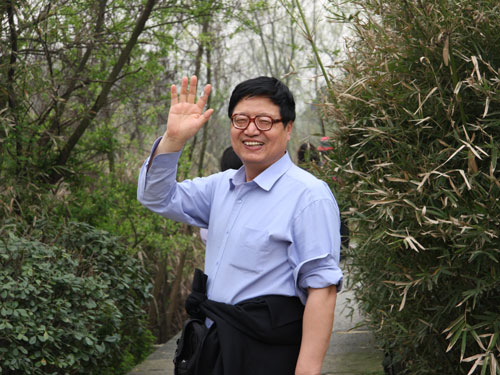|
Liu Kefeng, an expert in turning waste into wealth
Liu Kefeng was born in 1955. He is a professor at Beijing Agricultural College who has dedicated himself to transforming animal droppings into useful fertilizer for over 20 years. His research group has made great achievements through their discovery of a high efficiency, low cost and easy to operate transforming technology. Beilangzhong Village used to be a mess, with pig droppings piled high, flies humming around and waste water flowing rampantly through the streets and ditches. In 1997, cadres in the village turned to Liu Kefeng in hope of solving their pollution and recycling problem. Liu and his group members settled there for 18 years to study the pig excrement and attempt to invent an organic fertilizer derived from it. They helped to build an organic fertilizer factory and overcame a great number of difficulties and harsh conditions. It was not uncommon for them to study in a room of less than 15 square metres, filled with excrement piled a half-metre high, for more than two hours. This special memory has left a deep impression on each of the members. Fortunately, their efforts paid off. Not only have they been able to devise an appropriate system for disposing of the animal droppings, but they also transformed them into fairly effective fertilizer which has successfully been applied to the farmland. Beilangzhong Village has already become the most beautiful village in Beijing. Liu admits that few people were willing to take on the job of researching excrement and waste. When he needed to solve a garbage sorting problem in 1993, he and two professors had to take sampling tests in the scrap heap all day. "My wife did not allow me to enter the house," said Liu laughingly. The results of this experiment later laid the foundation for the garbage classification standards in Beijing. The same story took place in another village plagued by cattle droppings. Over 10,000 cattle brought the village economic prosperity, but they also brought severe pollution, even posing a threat to the environment of Beijing. Because of the great disparity between pig and cattle droppings, Professor Liu Kefeng had to start the new project from scratch. "Sometimes we would wait beside a cow for a fresh sample, and our shoes would end up getting buried by droppings," recalls Professor Wang, a colleague of Liu. There is no sign of cattle droppings in the streets now, and the air has become clean and fresh again. Pollution caused by animal excrement has been a global issue for years. Liu and his group in China have succeeded in solving the problem and turning the waste into wealth, greatly improving the environment of the country and opening up a new channel of agricultural recycling. Unlike many other countries, China is endeavoring to develop technology with low cost and low energy consumption. The fruits of Liu's experiments have been applied to dozens of testing fields, and it is estimated that they will create huge social and economic benefits worth over 2 billion yuan. |
| Copyright © China.org.cn. All Rights Reserved 京ICP证 040089号 京公网安备110108006329号 网络传播视听节目许可证号:0105123 京公网安备110108006329号 京网文[2011]0252-085号 |

 0
0 








Go to Forum >>0 Comment(s)